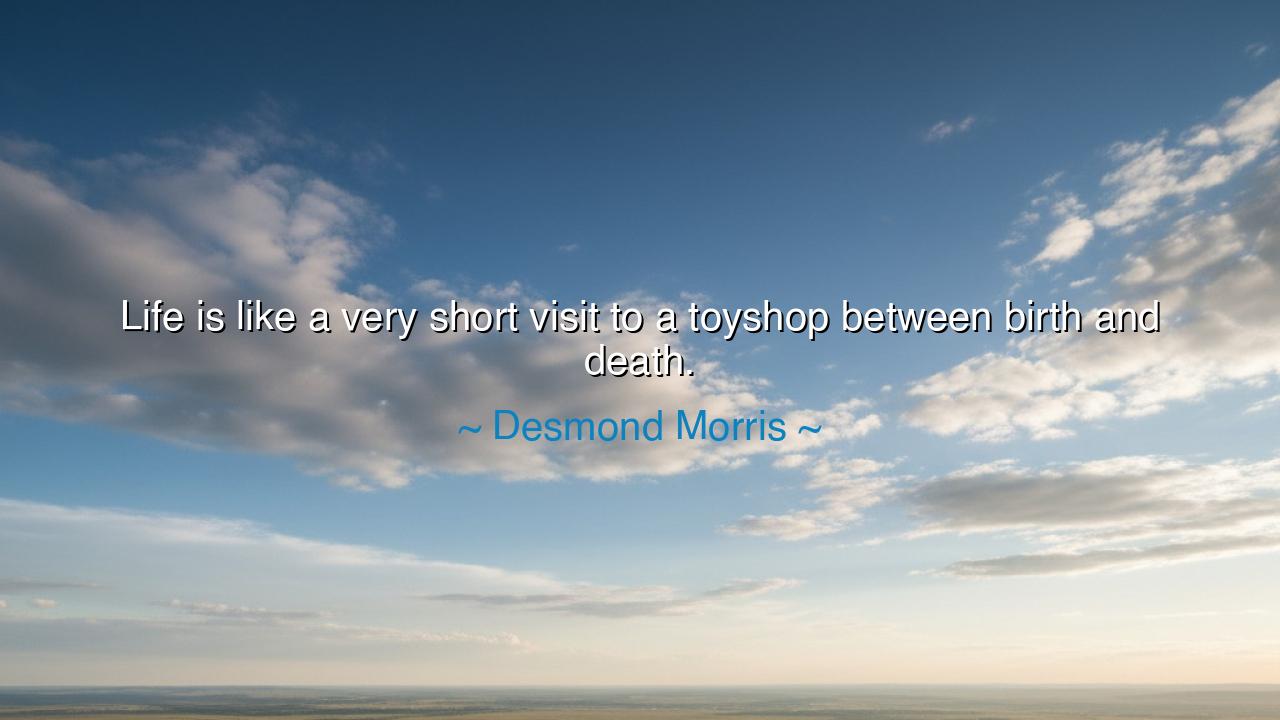
Life is like a very short visit to a toyshop between birth and






In the gentle and contemplative words of Desmond Morris, the zoologist, artist, and philosopher of the human condition, there lies a truth at once tender and tragic: “Life is like a very short visit to a toyshop between birth and death.” Though spoken in simplicity, this saying holds within it the vast arc of human existence—the joy and wonder of our brief time upon the earth, and the sorrow that it passes so swiftly. Like a child in a realm of wonders, we are given but a fleeting moment to touch, to marvel, to play, before the doors close and we must return to the silence from which we came.
Desmond Morris, known for his keen observation of both animal and human behavior, saw life not through the eyes of despair but through those of curiosity. His metaphor of the toyshop is not one of foolish pleasure, but of sacred play. The world, he suggests, is filled with beauty, with creation, with endless things to explore. Yet, our time among them is short—so short that to squander it on bitterness, greed, or fear is to waste the one visit we are granted. We are all children in this cosmic storehouse, dazzled by color and sound, reaching out to grasp meaning from the shelves of time.
The ancients, too, knew this truth. The philosopher Heraclitus once said that “Time is a child playing, moving pieces on a board; the kingdom belongs to a child.” In this, he saw the divine playfulness at the heart of creation. To live wisely is not to reject joy, but to embrace it with awareness—to understand that the toys we clutch are temporary, yet the wonder they awaken is eternal. Just as the child in the toyshop must one day leave, so must we, but what we carry with us—the memories, the laughter, the love—those are the true treasures.
Think of Anne Frank, a young girl who, even while hiding in the shadows of war, wrote of the beauty of the world beyond her window. “I don’t think of all the misery,” she said, “but of the beauty that still remains.” In her words lives the same spirit that Morris speaks of—the ability to find joy in a moment, to see wonder even in a confined space. She, too, had only a short visit to the toyshop of life, yet in that brief time, she touched eternity with her innocence and her courage.
The toyshop also reminds us of impermanence. The toys that once delighted us will break; the colors that once dazzled will fade. The people we love will leave, and we ourselves will one day be gone. Yet to lament this is to miss the lesson. Desmond Morris calls us not to mourn the brevity, but to cherish the immediacy—to pick up each toy, each experience, each friendship, and delight in it while it lasts. The wise do not ask how long the toyshop will remain open; they ask how deeply they can wonder while they are inside.
Still, his words carry a shadow of warning. Many enter the toyshop and become possessive, fighting for toys they cannot keep, forgetting to play. Others grow fearful, unwilling to touch anything for fear of loss. Both live in illusion. The enlightened child, however, understands the truth: that nothing is theirs, that the beauty lies not in possession but in participation. To live fully, one must play—not in greed or ignorance, but with gratitude and awe.
Therefore, O listener, let this be your wisdom: life is short, but vast within its brevity. Be curious as a child, but mindful as a sage. Laugh often, love deeply, forgive quickly, and marvel at the simplest of things—a sunrise, a song, a friend’s voice. For these are the toys of the soul, and their worth cannot be measured.
And when the time comes to leave the toyshop, do not weep that the visit has ended. Rejoice that you were ever allowed to enter at all. Walk toward the door with gratitude in your heart and light in your eyes, knowing that though the toys remain behind, the wonder they awoke will follow you beyond the threshold of death—and that, perhaps, is the truest form of eternity.






AAdministratorAdministrator
Welcome, honored guests. Please leave a comment, we will respond soon